Table of Contents
Ginseng is one of the most popular and well researched herbal medicines in the world. It has been used in North America and Asia for thousands of years.
In all, there are 11 species of ginseng. But the name “ginseng” as a nootropic usually refers to either American ginseng (Panax quinquefolius), or Asian ginseng (Panax ginseng). Panax means “cure-all” in Greek.
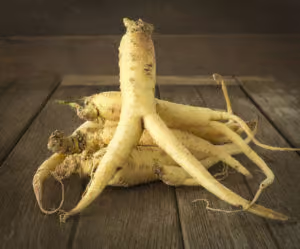
Researchers in thousands of clinical trials have reported on the efficacy of ginseng for; anti-stress, cognition, memory, anti-wrinkle, flu, digestion, diabetes, erectile dysfunction, blood circulation, immune deficiency, menopause, anti-oxidant, cancer and much more.
Ginseng is rich in various pharmacological compounds. Including a series of polyacetylenes, polyphenolic compounds, acidic polysaccharides, and tetracyclic triterpenoid saponins (ginsenosides).
Both American and Asian Ginseng contain ginsenosides which researchers believe are the most active ingredient.
Here we are investigating ginseng as a nootropic.
Ginseng helps:
- Mood and Stress. Ginseng helps improve mood and reduce stress. It works as an adaptogen, reducing adrenal fatigue, boosting GABA and providing an anti-stress effect.[i]
- Neurotransmitters. Ginseng provides neuro-protective effects on the dopaminergic-pathway which can help with ADHD.[ii] And ginseng is a serotonin and norepinephrine reuptake inhibitor. Working as an antidepressant and helping some symptoms of ADHD.[iii]
- Brain Energy. Ginseng acts as an anti-inflammatory by reducing cytokines. And as an anti-oxidant. Boosting ATP production in mitochondria, in part because this antioxidant effect shields mitochondria.[iv]
Overview
Ginseng is the most famous medicinal herb in Asia. It must be grown for 5 years before its harvested. The maturity of the plant influences the density of active compounds beneficial to human health.

The term “ginseng” comes from the Chinese word ‘rénshēn’ (person + plant root). Because the root shape of ginseng resembles the legs of a human.
“Panax” comes from the Greek ‘pan’ (all) and ‘akos’ (cure). In traditional Asian medicine ginseng was used for many different issues affecting human health. An “over-all” cure.
The four largest producers of ginseng are South Korea, China, Canada and the U.S, with Canada being the largest exporter. The largest consumer of ginseng is South Korea.
South Korea also conducts the majority of research on ginseng. With 1,000 scholars who publish at least 100 research papers per year.[v]
The two primary ginsengs used for brain function are Asian Ginseng (Panax ginseng), and American ginseng (Panax quinquefolius).
Ginsenosides increase protein synthesis and the activity of neurotransmitters in the brain. And ginseng stimulates the formation of blood vessels and improves blood circulation in the brain. Which improves memory and cognitive abilities.[vi]
How does Ginseng work in the Brain?
Ginseng boosts brain health and function in several ways. But two in particular stand out.
- Ginseng boosts physical and mental energy. Many of us deal with a lack of energy and chronic fatigue nearly every day. In today’s world, and particularly in Western society, we’re suffering from mental and physical fatigue. From overworked, stressed students to seniors.
But this kind of fatigue is not a natural offshoot of ‘getting older’. Often it’s difficult to pinpoint what exactly is causing this fatigue. And the first thing most of us think of is reaching for an energy drink, caffeine, or a prescription stimulant.
While these options may work in the short-term, they don’t produce natural energy in your body. This is where ginseng comes in and saves the day.
One double-blind, placebo-controlled trial with 30 healthy young adults demonstrated Panax ginseng’s cognitive benefits. The study found that a single dose of 200 mg or 400 mg of ginseng reduced blood glucose levels. And significantly reduced mental fatigue.[vii]
- Ginseng improves memory and learning. Most people who use ginseng report feeling more alert. And several trials show Asian ginseng can improve thinking and learning. Some of the research shows Panax ginseng can boost performance on mental arithmetic, concentration, and memory.
One example of several that show how ginseng seems to affect memory and learning is by boosting nerve growth factor (NGF) and neurite growth in the brain. This study was done on chicks with the ginsenoside Rb1.
The researchers found this ginseng extract significantly potentiated NGF and showed neurite outgrowth. [viii]
How things go bad
Our brain chemistry and energy metabolism are constantly changing. And any number of factors from chronic stress to disease and environmental factors can degrade cognitive function.
↓ Memory, recall, reaction time and mood decline
↓ Neurotransmitters and cellular signaling breakdown
↓ Chronic stress reduces memory capacity and overall brain health
↓ Nerve growth factor and neurogenesis decline
↓ Free radicals and inflammation damage brain cells
↓ Immune system is compromised
All of these changes can happen at any age. And are certainly contributing factors to age-related cognitive decline.
Ginseng benefits
Panax ginseng (Asian) and Panax quinquefolius (American) contain a collection of active compounds called ginsenosides. These triterpenoid saponins (plant chemicals) are unique to the ginseng species of plants. And are steroid-like in nature.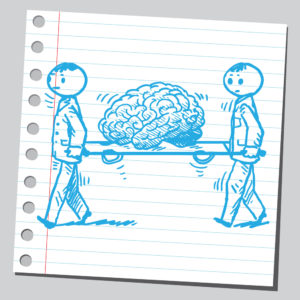
Here’s a mind-blowing statistic; well over 100 different ginsenosides exist.[ix] The major ones are designated Ginsenoside Ro, Rb(1), Rb(2), Rc, etc. All are extracted from the rhizome (root) of the ginseng plant.
You’ll notice if you’ve reviewed any of the other nootropics listed on NootropicsExpert.com that I usually include a diagram of the active chemical compound in that nootropic.
In this case I’m not including the diagram because each compound extracted from ginsenoside is different. And there are dozens of them.
Each ginsenoside has a unique effect in your body and brain. And is often even metabolized differently in your digestive system.
Other components of ginseng include;
-
- Polysaccharide ‘Ginsan’ which is an immune system modulator[x]. Ginsan is likely what helps tame inflammation in the brain. Which helps a host of cerebral functions like; neurotransmitters working more effectively, prevents apoptosis (cell death), improves memory, mental energy and more. Anti-inflammatories or not talked about much in the nootropics community. And I think in the future you’ll be hearing a lot more about how important they are to cognitive health and brain function.
-
- MicroRNA’s which are gene modulators. Researchers have recently identified up to 73 MicroRNA’s in ginseng.[xi] These tiny non-coding molecules are capable of regulating the gene expression in the DNA of your brain cells. Which is an extremely complex subject in itself. And have the potential to affect nearly everything that happens in your brain.
-
- Polysaccharides which have anti-cancer effects. Another subject not talked about in nootropic circles. But fundamentally important to brain health.[xii]
- The amino acids L-Arginine and GABA (gamma-aminobutyric acid), and glutamate.[xiii] The neurotransmitter GABA is naturally produced in your brain and provides anti-anxiety and calming effects. Likely why supplementing with ginseng has a calming and anti-anxiety effect.
- Polysaccharides which have anti-cancer effects. Another subject not talked about in nootropic circles. But fundamentally important to brain health.[xii]
Several books could be written on how ginseng affects your brain. Including its appetite-suppressant qualities, ability to boost cognition, reducing fatigue, reducing depression, anxiety, stress, improving memory and learning, as a neuroprotectant, and increasing cerebral blood flow.
How does Ginseng feel?
Supplementing with ginseng should boost your energy levels, both physical and mental energy. Ginseng has stimulant-like qualities and should help if you’re dealing with chronic fatigue. But unlike standard stimulants, your boost in energy will come with a more ‘relaxed’ feel.
Ginseng can boost mental alertness. And thinking should feel quicker and clearer. Recall and long-term memory should improve.
Ginseng also boosts your immune system so you may be able to avoid the flu or a cold. Ginseng is particularly helpful for anyone with a compromised immune system. And if you’re living with, or working around anyone else who is sick.
Ginseng Clinical Research
Much of the research on ginseng comes out of South Korea. And much of this research has been done with Asian ginseng (Panax ginseng). Showing how Panax ginseng improves cognitive function.
American ginseng (Panax quinquefolius) has a somewhat different ginsenoside profile from Panax ginseng. And it too shows promise in benefiting human cognition.
American ginseng boosts working memory
One double-blind, placebo-controlled trial was conducted with 32 healthy young adults. In this trial, researchers used a highly standardized extract of American ginseng (Cereboost™). Cereboost™ is Panax quinquefolius standardized to 10.65% ginsenosides.
This trial used doses of 100, 200 and 400 mg of standardized ginseng. And participants’ mood, cognitive function and blood glucose were measured at 1, 3 and 6 hours after taking the ginseng extract.
The researchers found that standardized American ginseng provided a significant improvement in working memory. Reaction time accuracy and ‘calmness’ significantly improved at just the 100 mg dose. And improved with higher doses.
The scientists concluded that there was, “robust working memory enhancement following administration of American ginseng”. And these effects are distinct from that of Asian ginseng.
The two ginsengs have different psychopharmacological properties that depend critically on ginsenoside profiles.[xiv]
The bottom-line of this study is that the kind of ginseng you use makes all the difference.
Panax Ginseng Protects & Fuels Brain Mitochondria
A stroke is caused by insufficient blood flow to that part of the brain where the stroke occurs. Lack of blood flow shuts down the oxygen and nutrient supply to brain cells. And things start to break down in the heart of the cell’s energy center – the mitochondria.
This study was done in the Neurology Department at Xijing Hospital in China. Researchers wanted to find out if ginsenoside Rd, one of the major active ingredients in Panax ginseng could protect the brain from stroke.
Rats were given ginsenoside Rd and then subjected to a stroke by reducing blood flow to part of their brain. (Note for gratitude journal – I’m thankful I’m not a lab rat).
The scientists found this Panax ginseng extract protected the rat brain from stroke. And it appeared to do it by protecting brain cell mitochondria from dysfunction, and apoptosis (cell death).[xv]
Researchers also demonstrated that ginseng activates multiple enzymes in the Krebs cycle. This helps mitochondria produce maximum energy in the form of ATP from glucose.[xvi] Which is one of the reasons why supplementing with Ginseng boosts mental energy.
Ginseng Improves Mental Performance
Actoprotector is a new term given to natural compounds that increase mental performance. And enhance your body’s ability to withstand physical loads without increasing oxygen consumption.[xvii]
Actoprotectors are a new subclass of adaptogen that increase physical performance. And some extracts of Panax Ginseng are considered Actoprotectors.
The main difference of Actoprotectors and psychostimulants (caffeine, Ritalin, modafinil, adrafinil, etc.) is that Actoprotectors cause no increase in oxygen consumption or heat production.
The results in improved mental and physical performance are similar. But there’s no “crash” in 4 hours like you get from using a stimulant like Ritalin. You don’t experience the same kind of ‘mental load’ when using ginseng.[xviii]
Ginseng’s steroid-like phytochemical called ginsenosides are what provide this stimulant-like action in the brain. And an improvement in overall quality of life.
One report in 2003 evaluated 9 clinical trials done with humans with ginseng doses from 80 – 400 mg. Study duration spanned 2 – 9 months. And nearly every study evaluated demonstrated some improvement in Quality of Life score.[xix]
Ginseng Recommended Dosage
Dosage of ginseng depends on the extract used, and the quality of the extract. And results seem to be largely dependent on the quantity used.[xx]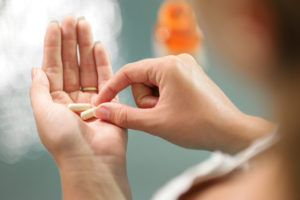
To complicate things even more, ginseng dosage depends on the region where its grown, extract strength, and individual needs.
The Chinese for example recommend 2 grams daily while in Europe, the suggested range is 100 – 400 mg daily.
Many naturopaths recommend cycling ginseng. Use it for 3 to 4 weeks and take a week break. Remember, ginseng has steroid-like active compounds. So taking it for extended periods without a break is not recommended.
Ginseng has been and continues to be extensively researched. These doses are based on clinical trial data:
- For stress, anxiety or fatigue: 1-gram ginseng daily dosed 500 mg twice per day
- For Type 2 diabetes: 200 mg per day
- For erectile dysfunction (ED): 900 mg of Panax ginseng 3-times per day
The bottom-line is to stay within the dosage recommended by the ginseng supplement manufacturer.
Ginseng Side Effects
Ginseng is a natural supplement and side effects are generally mild. But it can act as a stimulant in some people. Which can cause anxiety and insomnia.
Long-term use or higher than recommended doses can cause headache, dizziness and stomach upset. If you’re going to use ginseng you should cycle your dosing. Use the recommended dose for 3-4 weeks and take a week off before dosing again.
Women may experience menstrual changes when supplementing with ginseng.
Ginseng is NOT recommended by the under-18 neurohacker. Or women who are pregnant or breastfeeding.
Ginseng may affect blood sugar levels. So if you’re taking drugs for diabetes, check with your doctor first before supplementing with ginseng.
If you are dealing with kidney disease you should avoid using American Ginseng.
Ginseng can interact with:
- Blood-thinning medications
- Antidepressants
- Antipsychotic medications
- Stimulants including caffeine, Ritalin, Adderall, modafinil, adrafinil, etc.
- Morphine
Types of Ginseng to buy
Ginseng supplements are made from ginseng root and root hairs. It’s available in dried, powdered, capsule and tablet forms.
Ginseng is also included in some nootropic stacks and other combination supplement formulas. Some with patented ginseng extracts like Cereboost™, GS15-4, and others.
Experienced users of ginseng seem to prefer American Ginseng (Panax quinquefolius) over Asian Ginseng (Panax ginseng). Each is a unique species of ginseng but both have ginsenosides.
But American Ginseng is cultivated under stricter conditions avoiding pesticides and herbicides. And the colder growing climate encourages higher concentrations of the active ingredients in ginseng.
When buying American ginseng, look for Panax quinquefolius. And when buying Asian ginseng, look for Korean, red or Panax ginseng.
And finally, make sure you buy from a reputable supplement maker. Very recently GNC, Target, Walgreens and Walmart stores in the U.S. were found to contain either contaminants or little to zero ginseng. Walgreens ginseng brand was found to contain nothing but garlic powder and rice.[xxi]
Nootropics Expert Recommendation
Ginseng 100 – 400 mg per day
 I recommend using Ginseng as a nootropic supplement.
I recommend using Ginseng as a nootropic supplement.
Your body does not make Ginseng on its own. So you must take it as a standardized supplement.
Ginseng is especially helpful for chronic fatigue. And a great way to provide a natural physical and mental energy boost.
Ginseng provides anti-anxiety and calming effects. And can boost mental alertness, memory, recall, and learning.
Ginseng is a powerful adaptogen that has been used for thousands of years. The ancient Chinese and other cultures used it for overall health.
We suggest starting with a dose of 100 mg daily. You can safely boost it to 4-500 mg per day depending on the brand and extract.
But remember that ginseng has steroid-like qualities. So make sure you cycle it. Use it for 3-4 weeks and take a week off. And don’t take it late in the day as it may interfere with sleep.
Many neurohackers prefer American over Asian ginseng. It has a slightly different ginsenoside profile. And is grown under stricter conditions ensuring quality and safety.

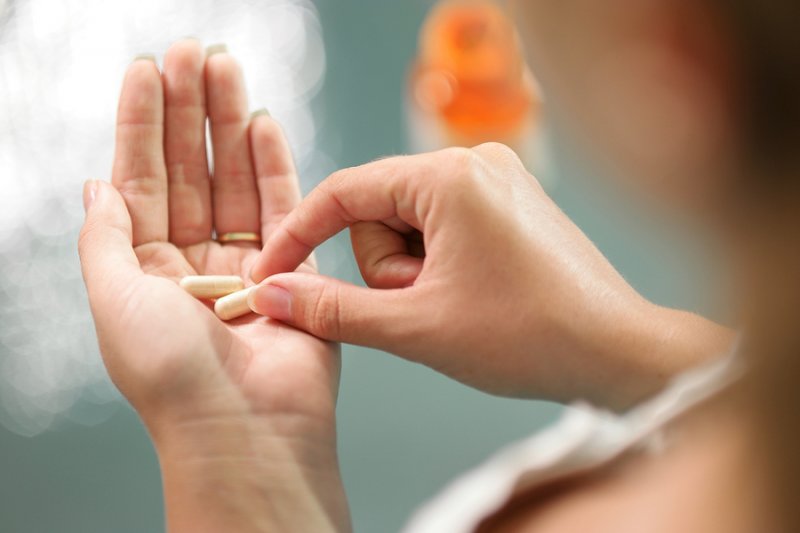
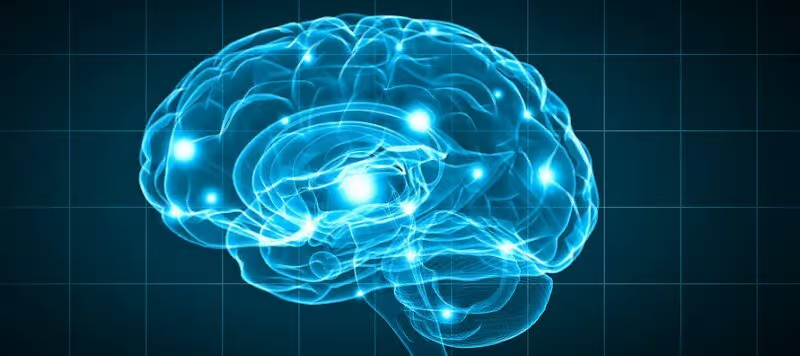






Join The Discussion - 111 comments
Mariah
January 5, 2020
How are neurotransmitters effected when ginseng + l glutamine is taken with dextroamphetamine ?
David Tomen
January 5, 2020
Mariah, Ginseng provides neuro-protective effects on the dopaminergic-pathway which can help with dextroamphetamine use. And L-Glutamine is a precursor to GABA so should help you avoid some of the negative side effects of using dextroamphetamine.
Eddie
October 23, 2019
Hi David, am I understanding the article correct in that ginseng helps increase serotonin? It also has the effect of increasing dopamine as well, right? Thanks,
Eddie
David Tomen
October 24, 2019
Eddie, Ginseng is a serotonin and norepinephrine reuptake inhibitor (SNRI): https://www.ncbi.nlm.nih.gov/pubmed/22435351 With a mechanism of action in your brain similar to other SNRIs like Effexor and Cymbalta.
Eddie
October 25, 2019
Thanks David. Can you recommend something to lower Dopamine? My last lab test reported a slightly elevated level of dopamine. On my genetic report my COMT has two variants. The COMT enzyme preserves dopamine, increasing its bioavailability. These genetic variants are probably causing the issue. Thank you.
David Tomen
October 26, 2019
Eddie, one of the easiest ways to tamp down dopamine is to increase serotonin. Start with 500 mg L-Tryptophan before bed. But be careful because dopamine and serotonin must be in balance or life gets unpleasant.
Eddie
October 28, 2019
Thanks David. I will monitor my S/D levels accordingly. I’ve tried tryptophan in the past with no benefits. Would 5HTP be a better option. I do have digestive issues, like IBS/SIBO and may have malabsorption. Would this be the reason why most of the supplements I take don’t seem to make any difference?
David Tomen
October 29, 2019
Eddie, long-term usage of 5-HTP (over 5 weeks) showed no benefit to mood. It’s a direct precursor to serotonin and it’s much too easy to overdose this supplement as well. L-Tryptophan is a far safer way to raise serotonin levels.
There are a number of reasons why someone would not respond to a supplement. But to “all” supplements seems highly unlikely.
Selecting the right stack of nootropics can take time and certainly be expensive. But sometimes there is no other way to start feeling better unless you make the investment and be willing to try different things until you find what works for you. And there is a high chance that it will take a stack of 6 or 8 different supplements depending on what is causes your issues.
Eddie
October 28, 2019
Hey David, in regards to your comment that if Serotonin and Dopamine are not in balance life could get unpleasant. Currently life is not pleasant for me. These are my most recent results for S&D. The results looks like a pretty good imbalance to me. Am I correct? Any comments are welcome. Thanks.
Serotonin, Serum, Result: 54 ng/mL, Ref. Range: 56-244
Dopamine, Plasma, Result: 32 pg/mL, Ref. Range:0 to 30 pg/mL
David Tomen
October 29, 2019
Eddie, what I mean by “unpleasant” is excess dopamine will cause side effects as will excess serotonin.
I’ve found that you cannot put much faith in blood tests for measuring neurotransmitter levels in your system. Because neurotransmitters are often synthesized in your gut or within brain cell membranes. And have no correlation to what’s in your bloodstream.
The only way to know if they are out of balance is to learn the side effects associated with too little and too much of dopamine and serotonin. Then you know what to watch for and will recognize the cause. It’s takes practice to learn to “listen to your body”. But it’s trying to send you messages all the time. We just need to learn how to listen.
Mek
August 28, 2024
For more accurate testing on neurotransmitters, you should get your cerebrospinal fluid tested. But that’s not so easy…
David Tomen
August 29, 2024
Mek, it still does not tell you how much of each neurotransmitter is in your brain. That is impossible to measure because these chemicals are produced by neurons in your brain. And last for a nano-second.
Richard
October 14, 2019
Can you recommend cycling ginseng 5 days on 2 days off indefinitely?
What kind of interactions occur while using ginseng with anti-depressants and/or modafinil?
Are nootropics that have anti-depressant effects considered anti-depressants?
David Tomen
October 15, 2019
Richard, Many naturopaths recommend cycling ginseng. Use it for 3 to 4 weeks and take a week break. No need to cycle it weekly.
Some nootropics can definitely be classed as “antidepressants” and need to be treated as such. Ginseng is a classic example. Because it is a serotonin and norepinephrine reuptake inhibitor (SNRI). Which means it boosts serotonin and norepinephrine. So you need to be careful about using it with drugs that boost serotonin and dopamine. I’d be careful stacking this with Modafinil because a spike in norepinephrine could cause heart problems. And stacked with an SSRI could cause Serotonin Syndrome.
mpanana
August 8, 2019
for adhd mere mucuna pruriens, rhodiola or resveratrol (a potent MAO-B) (or all of them combined since an active ingredient like mucuna only increases dopa while any of the rest keeps it in the synaptic cleft, to add to that latter too that it’s always best to add the mao or the reuptake inhibitor or both 1st, and anything dopa related molecule later on because of the time it takes for the body to adjust to the former etc)
these said, mere bupropion (yet another pharmocological agent that is made of a plant) can help (albeit much less that what the help would be if you could reach some modafinil which still is not a tenth as potent as ritalin, amphetamines etc) an interesting note and perhaps ‘experiment’ in a way would be mere dhea, it does possess strong dopamine both release and reuptake (it also improves choline concetration a problem only recently identified for most people suffering adhd and/or other neurological, neurodevelopmental and/or neurodegenerational issues) th deah because it is an active hormone should not be taken too lightly (still studies of over 2000miligrams/day broken in 2 dosages of a gram each, for 12 months or more did not show any problems like altered liver enzymatic processes etc, of course with dhea use for most people any serotonergic or nerepinephrine or dopamine (or a triple agent like panax ginseng for example or venlafaxine if you want to go down the man-made chemicals road) increasing by whatever mechanism agent should not for the most cases be used, unless the severity of the problem is too much and there is a doctor to assess the situation (after all serotonin syndrome is real and possible, etc)
ps. much to sorrow and understanding, the body yet again will built up both tolerance and i strongly suspect that since the body works in opposites, and has feed back mechanisms for everything (despite whatever mainstream medicine+pharmacology understand and/or what to admit) that is also the very problem of the thing too, you increase for example you whatever system, the body even after the original densensatization will try to compensate it by letting either amines be used or by other roots like (auto) upregulating (powered by genetic make up, thus genetic transcription seen and often understood and termed macroscopically as homeostasis), (so, say for example you increase dopa and noradrenaline via whatever mechanism, still after all the initial processes and in the longer run, all these fail simply because of the above homoestasis and similar receptors of different binding molecules but with same molecular outcome i.e. either increase or decrease of something, autogenetic, so for the above example, any such an agent would after a while cause an auto-upregulation of the glycine receptos etc) in other words both because of the very genetics of us and because of the getting used to whatever active agent, medicine is doomed to fail after a while, ideally only genetic modifications could solve it in the long run, a feat i am afraid we are too far away of completely understanding (thus solving too)
David Tomen
August 8, 2019
TIP: try separating your comment into more paragraphs. It’d be easier to read. But good stuff and thanks.
Bernardo
June 25, 2019
Hello, David.
Is it better to take ginseng on an empty stomach or with a meal?
I´m taking it together with ginkgo biloba and l-theanin.
Thank you.
David Tomen
June 25, 2019
Bernardo, good question. The thing is only parts of Ginseng are fat-soluble. Some of the ginsenosides need fat to cross into cells. So taking it with healthy fats or oils is likely best.
Bernardo
June 25, 2019
Makes sense. I couldn´t find infos about it anywhere (didn´t dig as much either).
Thank you for the answer 🙂
Ian
June 4, 2019
Please remove the citation for the claim that Panax Ginseng has any reuptake inhibitor action in the brain. The study linked had a sample size of three (3!) patients, and itself did not cite or prove that it had this effect. If you’d like to keep the claim, consider these studies on mice as citations instead, as they employ meaningful methods [1][2]
[1] http://sci-hub.tw/https://www.sciencedirect.com/science/article/pii/S0278584610002587
[2] http://sci-hub.tw/https://www.sciencedirect.com/science/article/pii/S0378874116323285
David Tomen
June 5, 2019
Ian, your spot-on with using clinical studies with such a small sample sizes. But it used humans and the clinical study you point to uses mice. Nonetheless, thanks for the suggestion.
Zack
May 3, 2019
Hey David! Thanks again for a great write up! I’m already taking Bacopa and am looking at adding Ginkgo and Ginseng for dopaminergic support for my ADHD. Is there any downside to combining these 3 herbs I should be aware of?
Thanks for everything!
David Tomen
May 3, 2019
Zack, no contraindications I’m aware with these three supplements. But keep recommended dosages in mind when stacking them please.
jayp
November 19, 2018
What are some synergies if using for studying and memory
David Tomen
November 19, 2018
Jay, this post shows how learning and memory work in your brain. And what I personally use every day: https://nootropicsexpert.com/best-nootropics-for-learning-and-memory/